|
|
|
Sort Order |
|
|
|
Items / Page
|
|
|
|
|
|
|
| Srl | Item |
| 1 |
ID:
188312


|
|
|
|
|
| Summary/Abstract |
On the 20 March 2003, George W. Bush launched Operation ‘Iraqi Freedom’. At the time, it was unlikely anyone in his administration envisaged that United States (US) troops would eventually rely on the largest force of private military contractors in recent times. Victory over Saddam Hussein and the ensuing occupation and reconstruction of Iraq would have not happened without the support of military contractors working behind the scenes to ensure that combat troops receive adequate supplies, maintain vehicles and equipment, and protect military bases and convoys. In Afghanistan, the US and the other countries participating in the North Atlantic Treaty Organization (NATO) International Security Assistance Force mission relied on contractors providing logistics and armed security to an even larger extent. The NATO-trained Afghan military itself inherited US dependence on contractors, whose departure from Afghanistan alongside American soldiers was identified as one of the factors underlying Kabul armed forces’ inability to confront the Taliban’s advance.
|
|
|
|
|
|
|
|
|
|
|
|
|
|
|
|
| 2 |
ID:
179552
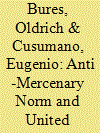

|
|
|
|
|
| Summary/Abstract |
A prominent anti-mercenary norm entrepreneur in the second half of the twentieth century, the United Nations (UN) has become an equally prominent user of Private Military and Security Companies (PMSCs) services in the twenty-first century. In this article, we explain the gap between UN talk and action on private providers of security as a form of organized hypocrisy. To map the mismatch between UN rhetoric and behaviour in a measurable fashion, we combined official data on the use of PMSCs with an in-depth content analysis of the reports written by the UN Working Group on Mercenaries and an examination of the UN Department of Safety and Security (UNDSS) contracting policy. The Working Group’s very negative portrayal of PMSCs and the UNDSS caveat that armed contractors should only be used as a last resort and stands in stark contrast with UN agencies’ widespread use of private security providers. Although a decoupling between talk and action is often inevitable for complex organizations simultaneously pursuing contradictory objectives like the UN, our findings have important implications for peacekeeping. Most notably, organized hypocrisy is in danger of challenging the UN’s credibility as a norm entrepreneur, hindering the effectiveness of its agencies’ outsourcing practices and delaying the reform of UN peacekeeping and crisis management at large.
|
|
|
|
|
|
|
|
|
|
|
|
|
|
|
|
| 3 |
ID:
143637
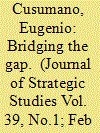

|
|
|
|
|
| Summary/Abstract |
The increasing use of private military and security companies (PMSCs) has attracted considerable scholarly attention due to its corrosive effects on US democracy. Drawing on neoclassical realism, this article provides a comparative dimension to the study of the political drivers of military privatisation by analysing contractor support to US and UK operations in Iraq and Afghanistan. Domestic political constraints have shaped both US and UK response to the need for more boots on the ground, increasing the propensity to use contractors as a force multiplier in spite of their problematic impact on military effectiveness.
|
|
|
|
|
|
|
|
|
|
|
|
|
|
|
|
| 4 |
ID:
141165
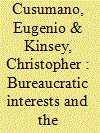

|
|
|
|
|
| Summary/Abstract |
In spite of its sensitivity, diplomatic protection has received very sporadic scholarly attention. This article provides a comparative analysis of US and UK diplomatic security policies, focusing on the increasing use of private military and security companies (PMSCs) for the protection of foreign service and development agencies’ personnel. The existing theoretical explanations of the privatization of security tasks cannot explain why countries displaying similar material incentives and similar political and market cultures have outsourced diplomatic protection to different degrees, nor can they account for variance in the use of PMSCs by different agencies within the same country. Our analysis highlights the importance of investigating organizations’ interests in providing a more accurate explanation of the varying propensity to outsource armed protection. In both the United States and the United Kingdom, the outsourcing of diplomatic security was a resultant of foreign policy bureaucracies and military organizations’ preferences.
|
|
|
|
|
|
|
|
|
|
|
|
|
|
|
|
| 5 |
ID:
188325
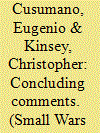

|
|
|
| 6 |
ID:
139201


|
|
|
|
|
| Summary/Abstract |
Initially based mainly on the use of Navy Vessel Protection Detachments (VPDs) paid by shipowners, Italian maritime security legislation also allows for the use of Privately Contracted Armed Security Personnel (PCASP) when VPDs are not available. Hence, Italy has adopted a hybrid antipiracy approach that entails two different forms of private sector involvement: the financing and partial control of public military forces by the maritime industry and the provision of armed security by PCASP, an option that includes Private Military and Security Companies (PMSCs). This opening to the commercial sector is significant as one of the first of its kind in a state that has adopted a tight monopoly over the provision of armed services and can be explained as the interplay between the willingness to respond to the needs of the maritime industry and a long-standing resistance against loosening state control over the use of force.
|
|
|
|
|
|
|
|
|
|
|
|
|
|
|
|
| 7 |
ID:
166613
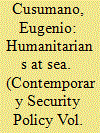

|
|
|
|
|
| Summary/Abstract |
Between 2014 and 2017, no less than 10 different non-governmental organizations (NGOs) conducted maritime Search and Rescue (SAR) operations off the coast of Libya. By rescuing over 100,000 migrants in three years, these NGOs became the largest provider of SAR in the Mediterranean. The theory of institutionalism suggests that organizations conducting similar activities are likely to converge in a process of mimetic isomorphism, deliberately imitating one another to increase their effectiveness and cope with uncertainty. These 10 SAR NGOs, however, developed two different rescue models: While some rescued migrants and disembarked them in Italian ports, others only simply assisted those in distress until the arrival of another ship transporting them to land. They also cooperated with Italian and European authorities to different degrees. Why did SAR NGOs imitated many elements of existing non-governmental rescue models, but discarded some others? This article argues that differences in material capabilities and organizational role conceptions are crucial to explain why newer SAR NGOs have imitated most but not all of their predecessors’ policies, engaging in a process of “selective emulation.”
|
|
|
|
|
|
|
|
|
|
|
|
|
|
|
|
| 8 |
ID:
163494
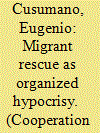

|
|
|
|
|
| Summary/Abstract |
In November 2014, Frontex started its Southern Mediterranean border monitoring operation Triton, followed in June 2015 by the Common Security and Defence Policy anti-smuggling mission EU Naval Force Mediterranean (EUNAVFOR Med) ‘Sophia’. Both operations’ outward communication has placed considerable emphasis on the conduct of maritime search and rescue. Still, this commitment was not matched by consistent action. Triton and EUNAVFOR Med have conducted a relatively limited number of search and rescue operations, prioritizing border control and anti-smuggling tasks. This article explains the gap between the European Union missions’ humanitarian rhetoric and an operational conduct primarily focusing on curbing irregular migration as a form of organized hypocrisy. Decoupling talk and action allowed Triton and EUNAVFOR Med to reconcile the conflicting expectations arising from European governments’ willingness to reduce migrant arrivals and the normative imperative to act against the loss of life at sea. However, the European Union missions’ organized hypocrisy had several negative externalities, hindering effective management of the humanitarian crisis offshore Libya.
|
|
|
|
|
|
|
|
|
|
|
|
|
|
|
|
| 9 |
ID:
160081


|
|
|
|
|
| Summary/Abstract |
From January 2015 to December 2017, approximately 1.6 million migrants crossed the Mediterranean to reach Europe. The death toll was dramatic, with almost 15,000 drowning. In response to the void left by the ending of the Italian-led Mare Nostrum mission, several non-governmental organizations (NGOs) launched their own search and rescue (SAR) operations, rescuing over 110,000 migrants. In this article, we argue that states have the responsibility not only to coordinate, but also to directly provide adequate SAR operations in the Mediterranean, and that these responsibilities are presently being abdicated. Although much criticism of NGO maritime rescuing operations is misplaced, non-governmental SAR has notable limitations, and states are ultimately responsible for this shortfall.
|
|
|
|
|
|
|
|
|
|
|
|
|
|
|
|
| 10 |
ID:
131102


|
|
|
|
|
| Publication |
2014.
|
| Summary/Abstract |
The increasing privatization of military and stability operations has received considerable scholarly attention. Existing scholarship, however, has largely focused on the privatization of state foreign policy, overlooking the empirical analysis of international organizations' use of commercial actors in the conduct of crisis management operations. The present study fills this gap by investigating the role of commercial contractors in supporting European Common Security and Defence civilian and military missions. By doing so, the article intends to advance the empirical knowledge of the privatization of foreign policy activities and the scope, determinants and future prospects of EU reliance on commercial actors for CSDP crisis management operations.
|
|
|
|
|
|
|
|
|
|
|
|
|
|
|
|
| 11 |
ID:
160905


|
|
|
|
|
| Summary/Abstract |
Italy has traditionally been wary of private providers of security. Still, private military and security companies (PMSCs) have recently started to play an important role in protecting Italian merchant vessels, eventually replacing the military vessel protection detachment units (VPDs) provided by the Italian Navy. Drawing on neoclassical realism, the increasing involvement of PMSCs in protecting Italian merchant ships is presented as an attempt to reduce the political costs associated with the use of military personnel abroad, epitomised by the arrest of two Italian Navy fusiliers by Indian authorities in February 2012.
|
|
|
|
|
|
|
|
|
|
|
|
|
|
|
|
| 12 |
ID:
178188


|
|
|
|
|
| Summary/Abstract |
International relations scholarship has paid insufficient attention to security providers’ tendency to emulate the visual attributes of other actors in an attempt to (re)construct their identities and increase their legitimacy by signalling adherence to prevailing norms. Research on the discourses deployed by private military and security companies (PMSCs), for instance, has relied almost exclusively on the analysis of written documents. This article argues that even basic visual units like logos serve as windows into the genealogy and evolution of the international market for force. By combining insights from Peircean semiotics and institutionalist theory, I show that PMSCs’ logos are not only marketing tools, but also symbolic acts that shed light upon the shifting identities and legitimization strategies of the international private security industry. Specifically, I argue that PMSCs’ logos can be conceptualized as forms of camouflaging, blame-shifting, mirroring and socialization into corporate identities. These overlapping processes have reshaped the international private security industry brandscape, informing a shift away from the use of logos displaying symbols and colours borrowed from military visual identity systems.
|
|
|
|
|
|
|
|
|
|
|
|
|
|
|
|
| 13 |
ID:
140111


|
|
|
|
|
| Summary/Abstract |
Although the privatisation of military support is increasingly widespread, advanced military organisations have not relied on Private Military and Security Companies (PMSCs) to the same degree. The existing scholarship on PMSCs cannot explain why countries sharing similar material incentives and similar market and political ideologies like the United States and the United Kingdom have not outsourced the same operational tasks. This article contends that introducing military role conceptions as a factor enabling or inhibiting the outsourcing of certain functions provides important insights into the scope of military privatisation, explaining why the US military has systematically privatised armed security and foreign military training, while the UK military has not
|
|
|
|
|
|
|
|
|
|
|
|
|
|
|
|
| 14 |
ID:
157787
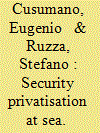

|
|
|
|
|
| Summary/Abstract |
In 2011, the growing number of pirate attacks prompted several flag states to authorise the use of armed guards aboard vessels. Despite facing the same threat, the United Kingdom, the Netherlands and Italy have adopted three distinct approaches to securing their merchant ships, ranging from the exclusive use of private security companies (PSCs) to the employment of military personnel only. This article conducts a congruence testing of the main theoretical explanations for the use of PSCs on land against UK, Dutch and Italian vessel protection policies. By relying on sequencing as a technique for theoretical synthesis, we develop a multicausal explanation of states’ vessel protection arrangements, showing the varying influence of functionalist, ideational, organisational and political drivers of security privatisation at different phases of the policy process.
|
|
|
|
|
|
|
|
|
|
|
|
|
|
|
|
| 15 |
ID:
181638


|
|
|
|
|
| Summary/Abstract |
The large number of asylum seekers dying off the coast of Libya has turned the Southern Mediterranean Sea into a new humanitarian space, prompting 11 non-governmental organisations (NGOs) to launch maritime Search and Rescue (SAR) operations between 2014 and 2017. These NGOs engaged in a complex web of interactions, ranging from rare instances of hostility, competition and mistrust to coordination, cooperation and integration. Drawing on role theory, I argue that organisational role conceptions are key to shaping NGO–NGO interactions. The humanitarian principles of neutrality, impartiality and independence serve as action scripts that inform NGOs’ role in the humanitarian space. Sea rescue NGOs have upheld different interpretations of humanitarian principles, developing supportive, neutral, or confrontational approaches vis-à-vis European governments’ border control policies. By leveraging content analysis and semi-structured interviews, I show that organisations with matching role conceptions have engaged in tighter forms of cooperation; charities with divergent role conceptions, by contrast, have shown a tendency to develop mistrust and engage in more competitive interactions. These frictions inhibited NGOs from forming a united front vis-à-vis policy restrictions and criminalisation, hindering the legitimacy and viability of non-governmental sea rescue.
|
|
|
|
|
|
|
|
|
|
|
|
|
|
|
|
| 16 |
ID:
184109
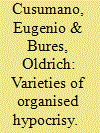

|
|
|
|
|
| Summary/Abstract |
International organisations (IOs) have increasingly resorted to private military and security companies (PMSCs) as providers of armed protection, training, intelligence, and logistics. In this article, we argue that IOs, seeking to reconcile conflicting international norms and member states’ growing unwillingness to provide the manpower required for effective crisis management, have decoupled their official policy on and actual use of PMSCs, thereby engaging in organised hypocrisy. Due to its stricter interpretation of norms like the state monopoly of violence, the United Nations (UN) has showcased a more glaring gap between talk and action than the European Union (EU) and the North Atlantic Treaty Organization (NATO), which display a more pragmatic, but not entirely consistent, approach to the use of PMSCs. By examining the decoupling between UN, EU, and NATO official contractor support doctrines and operational records, this article advances the debate on both security privatisation and organised hypocrisy.
|
|
|
|
|
|
|
|
|
|
|
|
|
|
|
|
|
|
|
|
|